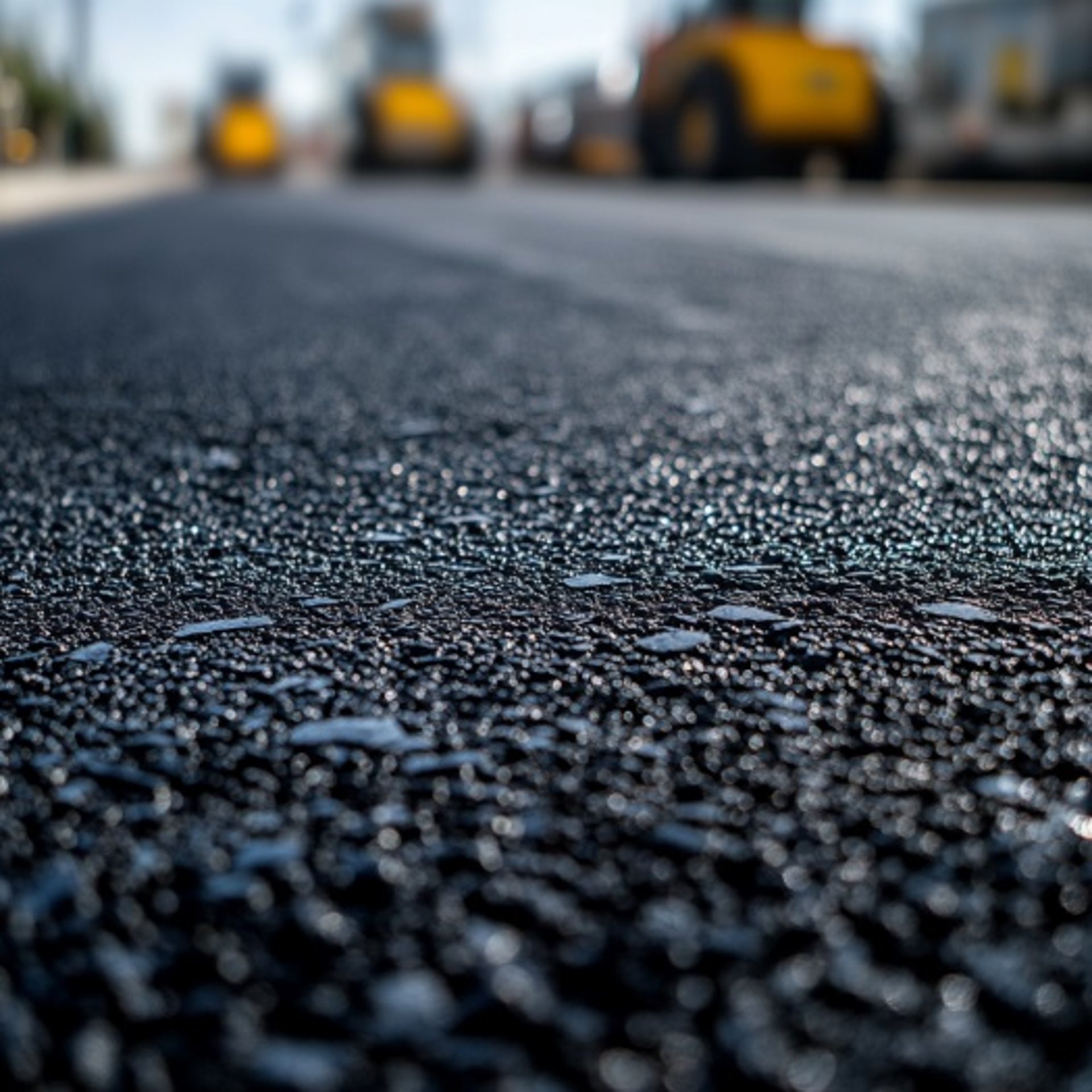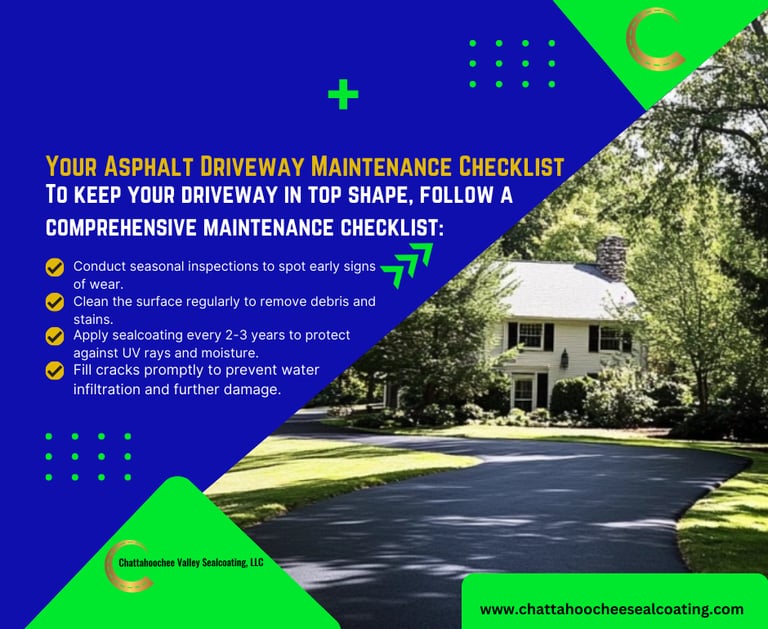How to Extend the Life of Your Asphalt Driveway: Tips from the Pros
Your asphalt driveway is a significant investment, and ensuring it lasts for years requires proper care and maintenance. Many homeowners unknowingly overlook simple yet effective ways to extend the life of their driveway, leading to premature damage and costly repairs. Understanding the factors that contribute to wear and tear, as well as how to proactively maintain your asphalt, can make all the difference. In this comprehensive guide, we’ll share expert tips and strategies for protecting and preserving your asphalt driveway, ensuring it remains functional, safe, and visually appealing for years to come.
Chattahoochee Valley Sealcoating
7 min read

The Importance of Regular Inspections
Regularly inspecting your asphalt driveway is the first step in ensuring its longevity. Small issues, such as hairline cracks or slight discoloration, can quickly escalate into significant problems if left unchecked. By conducting visual inspections at least once a season, you can identify early signs of wear and take action before they become costly repairs. Look for cracks, uneven surfaces, or pooling water, as these are indicators of underlying issues that need attention.
Sealcoating: Your Driveway’s First Line of Defense
Sealcoating is one of the most effective ways to protect your asphalt driveway from the elements. This process involves applying a protective coating that shields the asphalt from UV rays, moisture, and chemical spills. Not only does sealcoating enhance the appearance of your driveway by restoring its rich black color, but it also prevents oxidation and cracking. Experts recommend sealcoating every 2-3 years to maintain a durable and attractive surface.
How Weather Affects Your Driveway
Weather plays a significant role in the wear and tear of asphalt driveways. Intense sunlight can cause the surface to dry out and become brittle, while freeze-thaw cycles during winter can lead to cracks and structural damage. Heavy rainfall may erode the base layer, resulting in depressions or potholes. To mitigate weather-related damage, ensure proper drainage around your driveway and consider sealcoating to create a barrier against the elements.
Preventing Water Damage with Proper Drainage
Water is one of the most damaging elements for asphalt driveways. Without adequate drainage, water can pool on the surface or seep into cracks, weakening the foundation and leading to costly repairs. To prevent water damage, ensure your driveway slopes slightly away from your home to direct runoff. Additionally, clear gutters and downspouts regularly to avoid water pooling near the edges of your driveway.
The Role of Crack Sealing in Driveway Maintenance
Cracks are inevitable in asphalt driveways, but addressing them promptly can prevent more extensive damage. Crack sealing involves filling cracks with a flexible material that keeps water and debris out, protecting the asphalt’s base layer. This process not only extends the life of your driveway but also reduces the likelihood of potholes and alligator cracking. Routine crack sealing is a simple yet powerful way to keep your driveway in top condition.
Protecting Your Driveway from Heavy Loads
Asphalt driveways are designed to withstand regular traffic, but heavy loads such as parked trucks, RVs, or equipment can cause significant stress on the surface. Over time, these loads can lead to depressions, cracks, or even structural damage. To protect your driveway, avoid parking heavy vehicles in the same spot for extended periods and distribute weight evenly when possible. For additional support, consider reinforcing the base layer during installation.



The Benefits of Cleaning Your Driveway Regularly
Dirt, debris, and chemical spills can accelerate the deterioration of your asphalt driveway. Regular cleaning not only keeps your driveway looking fresh but also prevents abrasive particles from damaging the surface. Use a broom or a leaf blower to clear debris and wash the driveway with water and mild detergent to remove oil stains or chemicals. Address spills immediately to avoid long-term damage to the asphalt.
Why Edge Maintenance Is Critical
The edges of your driveway are more vulnerable to damage than the center. Without proper support, edges can crack or crumble due to the weight of vehicles or nearby soil erosion. To protect the edges, avoid driving too close to them and reinforce them with compacted gravel or concrete borders. Edge maintenance is often overlooked but is crucial for the long-term stability of your driveway.
Preventing Freeze-Thaw Damage
The freeze-thaw cycle during winter is one of the most destructive processes for asphalt. Water seeps into cracks, freezes, and expands, causing the asphalt to crack further. To minimize freeze-thaw damage, ensure that all cracks are sealed before winter begins. Additionally, use de-icing products sparingly, as some chemicals can weaken the asphalt. Opt for products that are labeled as safe for asphalt surfaces.
The Importance of Professional Installation
The longevity of your asphalt driveway begins with proper installation. A well-constructed base layer, appropriate grading, and high-quality asphalt mix are essential for a durable driveway. Hiring experienced professionals ensures that your driveway is built to withstand environmental and traffic stresses. Poor installation can lead to early signs of wear, such as uneven surfaces or cracking, which are costly to repair. Investing in professional installation is a critical step toward a long-lasting driveway.
How Sealcoating Prevents Oxidation
Oxidation occurs when your asphalt driveway is exposed to air and sunlight, causing the binder to deteriorate and the surface to become brittle. This process makes the asphalt more susceptible to cracking and other damage. Sealcoating acts as a protective barrier, reducing oxidation and keeping your driveway flexible and resilient. Regularly scheduled sealcoating not only extends the life of your driveway but also maintains its smooth and attractive appearance.
The Role of Regular Resurfacing
Over time, even well-maintained asphalt driveways will experience surface wear. Resurfacing, which involves adding a new layer of asphalt over the existing pavement, can restore the driveway’s strength and appearance without the cost of a full replacement. Resurfacing is ideal when the base is still in good condition but the surface shows signs of wear, such as cracks or fading. By resurfacing as needed, you can extend the life of your driveway significantly.
Why Early Crack Repair Matters
Cracks are one of the first signs of asphalt deterioration, and addressing them early is essential for preventing more severe damage. Left untreated, cracks allow water to penetrate the surface, weakening the base and leading to potholes or alligator cracking. Repairing cracks as soon as they appear with high-quality filler materials keeps your driveway structurally sound and reduces the risk of costly repairs down the road.
How to Protect Asphalt from UV Rays
UV rays are one of the most damaging elements for asphalt driveways, causing the binder to break down and the surface to dry out. This leads to brittleness, cracks, and fading. Sealcoating is the most effective way to shield your driveway from UV rays, as it forms a protective layer that reflects sunlight and preserves the asphalt’s integrity. Additionally, parking vehicles in shaded areas can further minimize UV exposure.
Avoiding Common DIY Maintenance Mistakes
While some homeowners opt for DIY asphalt maintenance, improper techniques or materials can do more harm than good. Using the wrong crack fillers, over-applying sealcoat, or neglecting proper cleaning before maintenance can lead to subpar results. For long-term success, rely on professional services or ensure you use high-quality materials and follow industry best practices. Avoiding these common mistakes will help preserve your driveway’s quality and lifespan.
How Proper Grading Prevents Water Damage
The slope of your driveway plays a critical role in protecting it from water damage. Proper grading ensures that rainwater and runoff flow away from the asphalt instead of pooling on its surface or seeping into the base. Poor grading can lead to standing water, which weakens the structure over time and causes cracks and potholes. If your driveway doesn’t have the right slope, regrading the surface or installing a drainage system can prevent long-term water-related damage.
The Impact of Heavy Traffic on Your Driveway
Repeated exposure to heavy traffic, such as large vehicles or construction equipment, can cause significant stress on your asphalt driveway. This wear and tear often manifests as depressions, cracks, or even structural failure. To mitigate the effects of heavy traffic, consider using reinforced asphalt during installation and avoid parking heavy vehicles in the same spot for extended periods. Spreading the weight evenly across the driveway can help maintain its structural integrity.
Maintaining Clean Edges for a Stronger Driveway
The edges of your driveway are particularly vulnerable to damage because they often lack the support provided by the center. Soil erosion, weeds, and overgrown vegetation can compromise the strength of the edges, leading to cracking and crumbling. Regularly cleaning and reinforcing the edges with compacted gravel or concrete curbs can help protect them. This simple step enhances the overall durability and appearance of your asphalt driveway.
The Benefits of Seasonal Maintenance
Each season presents unique challenges for asphalt driveways, making seasonal maintenance essential for long-term durability. In the spring, clear debris and check for cracks caused by freeze-thaw cycles. Summer is the ideal time for sealcoating to protect against UV rays, while fall is perfect for crack sealing to prepare for winter’s harsh conditions. By adapting your maintenance routine to the seasons, you can proactively address issues and extend the life of your driveway.
The Cost of Neglecting Asphalt Maintenance
Neglecting regular maintenance can lead to costly repairs and significantly shorten the lifespan of your driveway. Small cracks can evolve into large potholes, while faded, oxidized asphalt becomes brittle and prone to structural failure. The cost of preventative maintenance, such as sealcoating and crack repair, is far less than the expense of resurfacing or replacing an entire driveway. Staying ahead of potential issues saves both time and money in the long run.
How to Spot Early Signs of Asphalt Wear
Detecting signs of wear early can make a huge difference in maintaining the longevity of your driveway. Fading color, small cracks, pooling water, or rough textures are all indicators that your asphalt is beginning to deteriorate. Regularly inspecting your driveway for these signs allows you to address problems before they escalate. Proactive care, such as sealcoating and crack sealing, ensures these early issues don’t evolve into major repairs.
The Role of Professional Inspections
While regular visual checks are helpful, scheduling professional inspections ensures no potential issues are overlooked. Experts can identify hidden problems, such as weak spots in the base layer or early signs of oxidation, that may not be visible to the untrained eye. Professional inspections often include recommendations for tailored maintenance plans, helping you keep your driveway in peak condition for years to come.
The Environmental Impact of Proper Maintenance
Maintaining your asphalt driveway isn’t just beneficial for your property—it also has environmental advantages. Proper care reduces the need for frequent replacements, minimizing the demand for new materials and decreasing landfill waste. Sealcoating extends the life of your asphalt, while timely crack repair prevents water from eroding the base, reducing runoff pollution. Choosing eco-friendly maintenance practices helps protect both your investment and the environment.
The Long-Term Savings of Preventative Care
Investing in regular maintenance may seem like an added expense, but it leads to significant long-term savings. Preventative measures, such as sealcoating and crack sealing, cost far less than repairing or replacing a deteriorated driveway. By addressing issues early and maintaining the structural integrity of your asphalt, you avoid the higher costs associated with resurfacing or reconstruction, making preventative care a financially sound decision.
Your Asphalt Driveway Maintenance Checklist
To keep your driveway in top shape, follow a comprehensive maintenance checklist:
Conduct seasonal inspections to spot early signs of wear.
Clean the surface regularly to remove debris and stains.
Apply sealcoating every 2-3 years to protect against UV rays and moisture.
Fill cracks promptly to prevent water infiltration and further damage.
Reinforce edges to avoid crumbling and maintain structural integrity.
By sticking to this maintenance routine, you can extend the life of your asphalt driveway, save money, and enjoy a smooth, durable surface for years to come.






